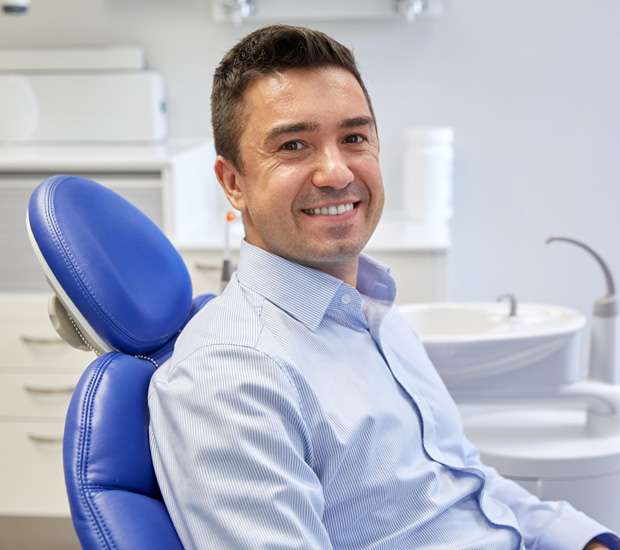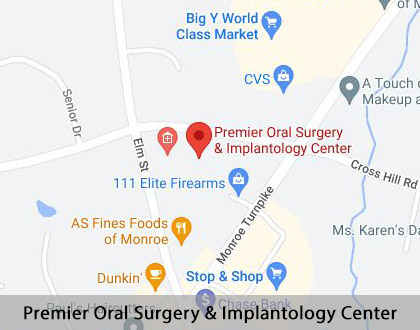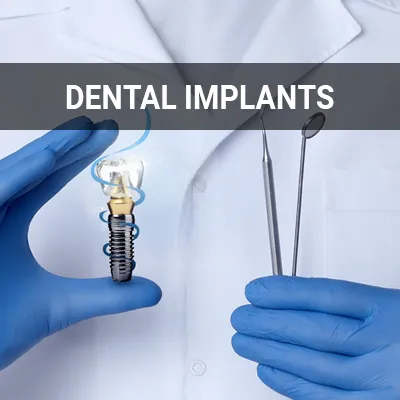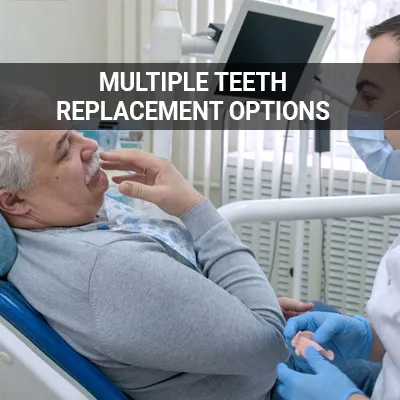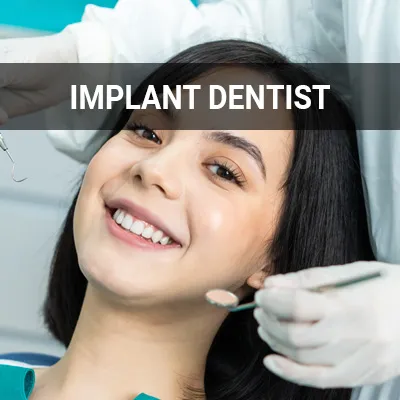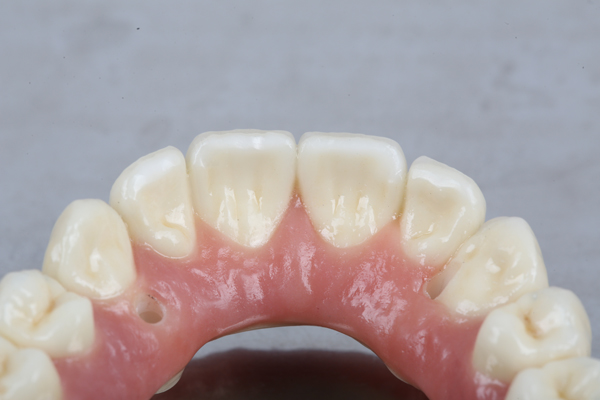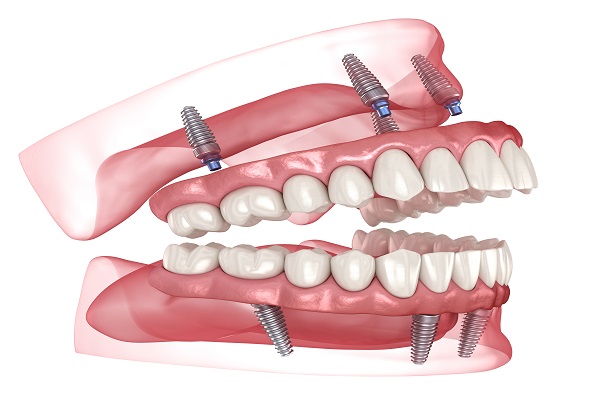Am I a Candidate for Dental Implants Monroe, CT
While most people are candidates for dental implants and their benefits, certain health factors or conditions can prevent them from receiving this treatment. The dental implant procedure is a tooth restoration in which an oral surgeon inserts implant posts into the jaw to support a dental prosthesis.
Dental implant restoration is available at Premier Oral Surgery & Implantology Center in Monroe and the surrounding area. Oral surgeons often recommend dental implants after a comprehensive evaluation of the patient. Call us today at (475) 474-6204 to book an appointment or learn more about our services.
A Great Restoration Option for Most People
Dental implants are a durable and popular dental restoration for people who have lost one or more teeth. However, failure to replace lost teeth makes chewing inefficient and may disrupt the structure of the oral cavity. Fortunately, people looking to restore the function and appearance of their smile can turn to dental implants. The dental implant process involves the surgical placement of a titanium implant into the jawbone to function as the foundation for a replacement tooth to keep it secure.
The oral surgeon will then attach an abutment and a dental prosthesis (crown, bridge, or denture) to complete the restoration process. Dental implants have a high success rate of up to 98 percent. This is because its position in the jawbone helps to stimulate the bone and keep the living tissue alive. The restoration is the closest patients can get to having teeth that look, feel, and function like their original teeth.
“Dental implants are a durable and popular dental restoration for people who have lost one or more teeth.”
How Dentists Determine Candidates for Dental Implants
When patients come in for their first visit, the oral surgeon will perform a thorough examination to assess the condition of their oral health. We can then determine whether it may result in dental implant complications. Our oral surgeon may recommend the proper treatment to restore good oral health and a patient’s dental implant candidacy if any issues are detected.
When determining whether a patient can safely and effectively receive dental implants, the oral surgeon may consider the patient’s overall well-being during the initial consultation for dental implants. Since the treatment requires surgery, the patient must be healthy to undergo the procedure. Also, certain conditions may affect the way the bone heals around the implant and the long-term success of the procedure, including:
- Cardiovascular conditions
- Diabetes
- Excess alcohol intake
- Medications such as NSAIDs, antidepressants, and bisphosphonates
- Smoking
Patients must complete treatment for any preexisting condition to prevent infection during the implant procedure.
“Patients must complete treatment for any preexisting condition to prevent infection during the implant procedure.”
Factors That Enable Patients to Receive Dental Implants
Healthy Gums
Having healthy gums is crucial to enabling a patient to receive dental implants. Gum disease is the leading cause of tooth loss in adults and is, therefore, one of the most common inhibitors to being eligible for dental implants. Periodontal diseases damage the gum and jawbone supporting the teeth. Since dental implants integrate with the jawbone, any infection that affects the gum may also jeopardize the jawbone. Therefore, there is a high risk of implant failure in patients with uncontrolled or untreated gum disease. The oral surgeon will only recommend dental implants once the condition is controlled.
Sufficient Bone Density
Along with healthy gums, having adequate bone density is crucial to dental implant candidacy. Bone density affects the condition of the jawbone. Jawbone health is crucial because it provides direct support for the implant. The implant restoration may come loose without proper reinforcement from a strong bone. The dentist will examine the jawbone to ensure it has the strength and density to hold an implant. Jawbone deterioration may follow advanced gum disease, causing erosion of healthy bone structure or tooth loss, when the jawbone stops receiving stimulation due to tooth loss. Fortunately, the dentist can use a bone graft to boost the strength and integrity of the jawbone.
“Along with healthy gums, having adequate bone density is crucial to dental implant candidacy.”
Check out what others are saying about our dental services on Yelp: Am I a Candidate for Dental Implants in Monroe, CT
Missing or Crowded Teeth
Missing or crowded teeth can also prevent a person from being a dental implant candidate. Tooth loss can be a result of infection, trauma, or accident. Sometimes, infection sets in if patients fail to adopt good oral hygiene practices, such as regular brushing and flossing, mouthwash, and visiting the dentist for checkups and cleanings. Occasionally, an oral surgeon can replace missing teeth with dental implants and restorations.
Additionally, people with crowded teeth may need orthodontic treatment or tooth extraction before receiving a dental implant. These treatments can help create enough space in a patient’s mouth to allow for dental implant placement. Anyone interested in dental implants must be ready to take their oral health seriously. Poor oral hygiene may cause premature failure of the implants. Usually, the dentist will provide instructions on how to take care of the new teeth properly.
“Additionally, people with crowded teeth may need orthodontic treatment or tooth extraction before receiving a dental implant.”
Questions Answered on This Page
Q. Why are dental implants a great restorative option for most people?
Q. How do dentists determine whether a patient qualifies for dental implants?
Q. What factors enable a patient to receive dental implants?
Q. Do missing or crowded teeth affect dental implant candidacy?
Q. What other common issues can prevent a person from being a dental implant candidate?
People Also Ask
Q. What is the dental implant process?
Q. What are a patient’s options for replacing multiple teeth?
Q. Why would a dentist refer a patient to a specialist for dental implant surgery?
Q. What are the different types of sedation?
Q. What should I expect after the tooth extraction?
Q. What dietary changes will be necessary after getting dental implants?
Other Common Inhibitors to Dental Implants
Teeth Grinding or Clenching
People who grind or clench their teeth may need to take extra precautions to protect their dental implants. Teeth grinding, also known as bruxism, can result from anxiety, sleep, stress, and hyperactivity. Bruxism places undue stress on the teeth and causes premature implant failure. Therefore, patients who grind their teeth need to take necessary precautions before getting dental implants, including using a mouthguard to protect the teeth from the effects of bruxism.
Patience for the Procedure
Another factor that may determine if dental implants are right for you is patience. Dental implant restoration may take as long as six months because of the osseointegration process. The dentist will only place the final restoration on the dental implants after the bone heals fully. Preliminary procedures such as bone grafts may add to the timeline. Fabricating the final restoration may also take weeks. Anyone considering dental implants needs to prepare for the commitment.
“People who grind or clench their teeth may need to take extra precautions to protect their dental implants.”
Frequently Asked Questions
Q. What happens if I have crooked or crowded teeth but need dental implants?
A. Crowded or crooked teeth can prevent a person from receiving dental implants successfully. Fortunately, patients can receive dental treatments such as tooth extraction to create space to place the implants. In addition, patients with crooked teeth may need teeth straightening treatment to align their teeth.
Q. Is there an age limit to getting dental implants?
A. Dental implants are suitable for adults with permanent teeth. Although older patients can get implants, they may not have the required bone density to support an implant, especially if they have worn dentures for a while. In such cases, a mini dental implant may be the more appropriate option since the metal post is shorter and needs less bone structure.
Q. Can I still receive dental implants if I wear dentures?
A. The dentist may be able to support your dentures with dental implants. Implant-supported restorations are usually stronger and more fitting than regular dentures. It will also prevent further jawbone resorption, which is common with denture wearers.
Q. How long does it take to receive dental implants?
A. The number of implants determines the duration of treatment. It may take about an hour to complete the placement. There is a waiting period during which the bone heals. Once osseointegration is complete, the dentist will complete the final restoration in no time.
Q. Are there any risks associated with dental implant placement?
A. Like any surgical procedure, there are some associated risks. Issues are rare and are usually minor and easily treatable should they occur. Such risks include infection, injury or damage to the surrounding oral structures, sinus issues, and nerve damage.
Start Feeling Better – Visit Us Today
By visiting us as soon as possible, our team can help get you the professional treatment you need. Instead of waiting around and allowing the symptoms to get worse, we can provide you with treatment options.
Call Us Today
If you are missing one or more teeth, you may be a candidate for dental implants. Our oral surgeon and dental team at Premier Oral Surgery & Implantology Center can determine if implants are right for you. Call us today at 475-474-6204 to learn more about our services or schedule a consultation.
Helpful Related Links
- American Dental Association (ADA). Glossary of Dental Clinical Terms. 2023
- American Academy of Cosmetic Dentistry® (AACD). Home Page. 2023
- American Academy of Maxillofacial Prosthetics. American Academy of Maxillofacial Prosthetics. 2023
- American Association of Oral and Maxillofacial Surgeons. American Association of Oral and Maxillofacial Surgeons. 2023
- American College of Oral and Maxillofacial Surgery. American College of Oral and Maxillofacial Surgery. 2023
- National Cancer Institute (NCI). National Cancer Institute (NCI). 2023
- WebMD. WebMD’s Oral Care Guide. 2023
About our business and website security
- Premier Oral Surgery & Implantology Center was established in 2019.
- We accept the following payment methods: American Express, Cash, Discover, MasterCard, and Visa
- We serve patients from the following counties: Fairfield County
- We serve patients from the following cities: Monroe, Botsford, Stepney, Shelton, Trumbull, Ansonia, Derby, Oxford, Woodbridge, Newtown, and Redding
- Norton Safe Web. View Details
- Trend Micro Site Safety Center. View Details
Back to top of Am I a Candidate for Dental Implants
